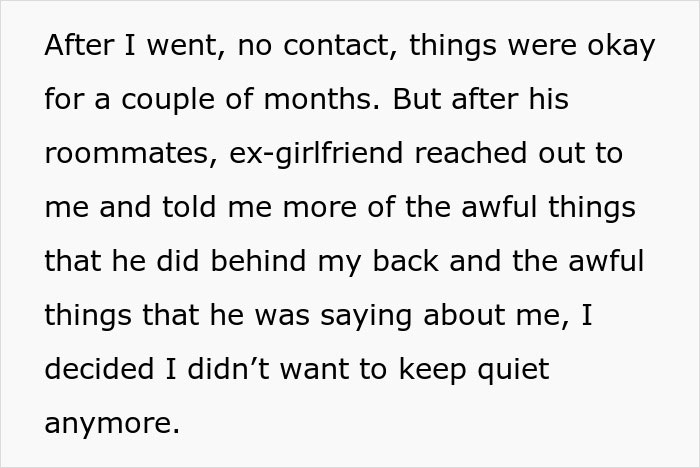Dating can be hard as it is, but if you get involved with a pathological narcissist, their manipulative behavior can push you to the point where you begin to question not only your worth but also sanity.
So when Reddit user TermGeneral6456 realized just how much emotional turmoil her toxic ex-boyfriend had caused her, she decided to hit him where she thought he’d hurt the most — his reputation.
After she executed her plan, the woman shared what happened on the subreddit ‘Petty Revenge,’ celebrating her rediscovered confidence and closure.
This woman was dumped by her boyfriend and learned that he had been unfaithful to her

Image credits: RDNE Stock project / Pexels (not the actual photo)
So she set out to get revenge




Image credits: Liza Summer / Pexels (not the actual photo)






Image credits: Vlada Karpovich / Pexels (not the actual photo)





Image credits: TC Ducas / Pexels (not the actual photo)




Image credits: TermGeneral6456

Image credits: Engin Akyurt / Pexels (not the actual photo)
People who go through such things can suffer from PTSD-like symptoms
You can understand the woman’s hurt. Of all of the threats to a committed relationship she has treated in four decades of working with couples, clinical psychologist and marriage counselor Dr. Randi Gunther found infidelity to be the most difficult to heal from.
“The partner who has been betrayed is emotionally tortured and humiliated when knowledge of the infidelity emerges,” Gunther writes. “They are clearly in trauma and experience the same array of symptoms that professionals now describe as post-traumatic stress disorder.”
Similar to others who have suffered threats to their physical or emotional well-being and security, they are disoriented and confused by what has happened and, according to the psychologist, may experience:
- Repeated intrusive thoughts;
- Unstable emotional regulation;
- Out-of-body experiences;
- Alternating between feeling numb and striking out in retaliation;
- Inability to stop scanning for any new data that might cause more distress;
- Feeling overwhelmingly powerless and broken;
- A need to regain self-worth by assigning blame;
- Confusion and disorientation.
While some people might argue that revenge isn’t the healthiest way to recover, Gunther highlights that the trauma of betrayal can also trigger memories of buried or unresolved emotional and spiritual damage from the past. “When those prior traumatic experiences are triggered and re-emerge, they significantly complicate the healing process,” she explains.
As psychotherapist Tonya Lester points out, people often see recovering from a relationship as binary—you’re either over someone or profoundly suffering. But that’s not how it works. For example, you might think you’ve moved past a breakup and then find yourself bursting into tears after a first date with another person because you miss the level of comfort you had with your ex. Our feelings can be confusing and contradictory.
After her story went viral, the woman joined the discussion in its comment section





People have been expressing their support for her and sending the woman their best wishes














